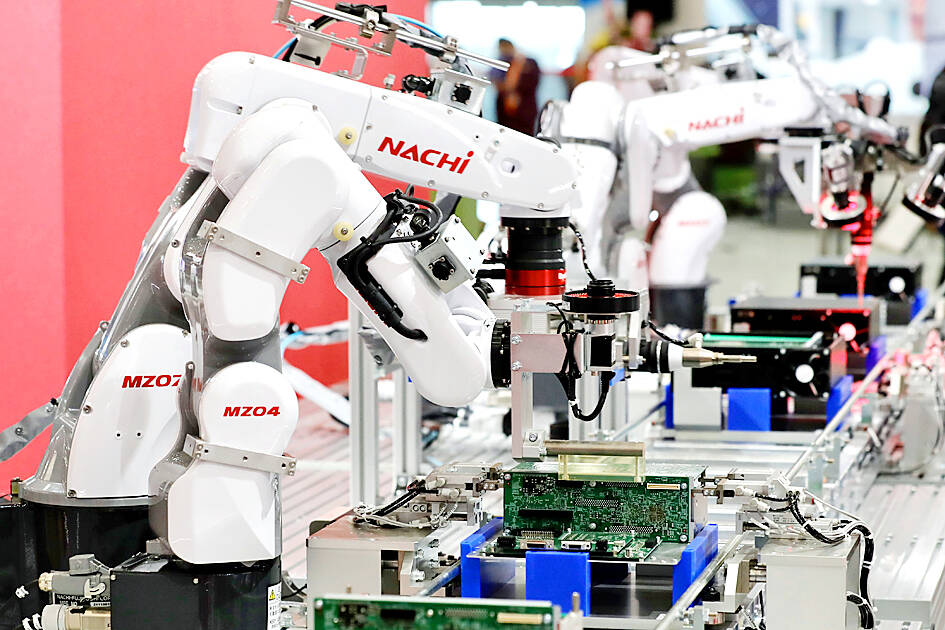The nation’s manufacturers in the second quarter of this year invested NT$539.7 billion (US$17.24 billion) in fixed assets, setting a record for the quarter, the Ministry of Economic Affairs said on Monday last week.
Investments rose 25.8 percent from a year earlier and 11.6 percent from a quarter earlier, driven mainly by semiconductor firms expanding production, the ministry said.
Manufacturers’ fixed assets include machinery and other production equipment, factories, and transportation equipment, but exclude land purchases.

Photo: Ritchie B. Tongo, EPA-EFE
The nation’s major semiconductor firms have poured funds into fixed assets from April to June to maintain their lead in high-end processes and meet demand for emerging technologies, such as 5G applications, high-performance computing devices and automotive electronics, the ministry said.
Memory chip and printed circuit board suppliers also increased their fixed-asset investments during the period, it added.
The electronic components sector spent NT$387.3 billion on fixed assets, up 35.9 percent annually and 9.1 percent quarterly, the ministry said.
Their spending accounted for 71.8 percent of all fixed-asset investments by the manufacturing sector, it added.
The chemical materials sector followed with investment of NT$28.1 billion, or 5.2 percent of the total investment by manufacturers. The figure rose 8.3 percent from a year earlier and 41.1 percent from a quarter earlier, as semiconductor makers placed large orders, the ministry said.
Many petrochemical firms also invested large sums in equipment to manufacture value-added products, it said.
The computer and optoelectronics industry took third place with investment of NT$14.1 billion, up 1.7 percent from a year earlier and 16.3 percent from a quarter earlier on the back of strong demand for servers and Web communications devices.
The nation’s manufacturing sector posted revenue of NT$8.72 trillion, up 10.4 percent from a year earlier and 4.3 percent from a quarter earlier, and the highest level for the second quarter, thanks to solid global demand for technology devices and rising raw material prices, the ministry said.
The figure includes revenue generated from overseas production facilities.
Fixed-asset investments are likely to continue growing as semiconductor firms expand production and offshore wind firms develop new projects, the ministry said.
However, geopolitical tensions, rising inflation and inventory adjustments could compromise growth, it said.

On Ireland’s blustery western seaboard, researchers are gleefully flying giant kites — not for fun, but in the hope of generating renewable electricity and sparking a “revolution” in wind energy. “We use a kite to capture the wind and a generator at the bottom of it that captures the power,” said Padraic Doherty of Kitepower, the Dutch firm behind the venture. At its test site in operation since September 2023 near the small town of Bangor Erris, the team transports the vast 60-square-meter kite from a hangar across the lunar-like bogland to a generator. The kite is then attached by a

Foxconn Technology Co (鴻準精密), a metal casing supplier owned by Hon Hai Precision Industry Co (鴻海精密), yesterday announced plans to invest US$1 billion in the US over the next decade as part of its business transformation strategy. The Apple Inc supplier said in a statement that its board approved the investment on Thursday, as part of a transformation strategy focused on precision mold development, smart manufacturing, robotics and advanced automation. The strategy would have a strong emphasis on artificial intelligence (AI), the company added. The company said it aims to build a flexible, intelligent production ecosystem to boost competitiveness and sustainability. Foxconn

Leading Taiwanese bicycle brands Giant Manufacturing Co (巨大機械) and Merida Industry Co (美利達工業) on Sunday said that they have adopted measures to mitigate the impact of the tariff policies of US President Donald Trump’s administration. The US announced at the beginning of this month that it would impose a 20 percent tariff on imported goods made in Taiwan, effective on Thursday last week. The tariff would be added to other pre-existing most-favored-nation duties and industry-specific trade remedy levy, which would bring the overall tariff on Taiwan-made bicycles to between 25.5 percent and 31 percent. However, Giant did not seem too perturbed by the

TARIFF CONCERNS: Semiconductor suppliers are tempering expectations for the traditionally strong third quarter, citing US tariff uncertainty and a stronger NT dollar Several Taiwanese semiconductor suppliers are taking a cautious view of the third quarter — typically a peak season for the industry — citing uncertainty over US tariffs and the stronger New Taiwan dollar. Smartphone chip designer MediaTek Inc (聯發科技) said that customers accelerated orders in the first half of the year to avoid potential tariffs threatened by US President Donald Trump’s administration. As a result, it anticipates weaker-than-usual peak-season demand in the third quarter. The US tariff plan, announced on April 2, initially proposed a 32 percent duty on Taiwanese goods. Its implementation was postponed by 90 days to July 9, then